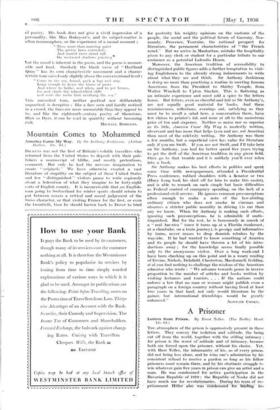Mountain Comes to Mohammed
DicxEss was not the first of Britain's voluble travellers who returned from the United States to deposit with their pub: fishers a manuscript of blithe, and mostly pretentious, comment. But only he had the nervous imagination to create " originals." We have otherwise created a vast literature of stupidity on the subject of those United States and few " distinguished " visitors pause to write copiously about a federation of what they imagine to be forty-eight sorts of English county. It is inconceivable that an English- man going to Switzerland for winter sports should return to put between covers a critical and moral judgement of the Swiss character, or that visiting France for the first, or even the twentieth, time he should hasten back to Dover to bind for posterity his weighty opinions on the customs of the people, the social and the political future of Gascony, Nor- mandy, Provence, Touraine, the national prospect for literature, the permanent characteristics of " the French mind." But we arrive in Manhattan, mistake the hospitality given to any clerk or student for a particular tribute to our eminence as a potential Lafcadio Hearn.
Moreover, the American tradition of accessibility to distinguished public figures adds a further temptation to visit- ing Englishmen to the already strong inducements to write about what they see and think. Sir Anthony Jenkinson is doing no more than practising a routine in meeting famous Americans from the President to Shirley Temple, from Walter Winchell to Upton Sinclair. This is flattering .as an intimate experience and must add a spice to the letters home. But letters, even as cheerful and fair as Sir Anthony's, are not equally good material for -books. And these reminiscences, reflections, evenings out, satisfying •as they must be to recall a salad here, a conversation there, have few claims to printer's ink and none at all to the monstrous price of. ten and sixpence. Neither so naive nor so superior as its title, America Came My Way is modestly written, observant and has more that helps (you and me, not America) than most of the celebrity writing. Sir Anthony was there a few months, but a superficial view has value for literature only if you are Swift. If you are not Swift, and I'll take betS on Sir Anthony, you had far better spend five years trying to get the drift of the American tradition in any given field: Once go to that trouble and it is unlikely you'll ever relax into a book.
Sir Anthony. makes his best efforts. in politics and spent sonic time with newspapermen, attended a Presidential Press conference, rubbed shoulders with a Senator or two (Huey Long took his shirt off for him to make this easier), and is able to remark on such simple but basic difficulties as Federal control of emergency spending, on the lack of a professional civil service. He ignores common preconceptions often enough to make a note of the law-abiding ordinary citizen who does not smoke in cinemas and observes a stricter public morality in driving Lis car than any we know. When Sir Anthony is making such efforts, ignoring such preconceptions, he is admirable if undis- tinguished. But for the rest, he is boresomely in search of a " real Atimiea " (once it turns up at a Florida steakroast, at a clambake, on a train journey), is gossipy and informative by turns, never ceases to drop donnish rebukes by the wayside. If he had wanted to know something of America and its people he should have thrown a lot of his intro- ductions away ; for the knowledge seems finally possible only to the anonymous visitor. Over a long week-end I have been checking up on this point and in a :weary reading of Ervine, Nichols, Delafield, Chesterton, Macdonnell, Golding, et at. can find nothing to challenge the wisdom of the American educator who wrote : " We advance towards peace in inverse proportion to the number of articles and books written by visiting lecturers and tourists. . . . If the nations could enforce a law that no man or woman might publish even a paragraph on a foreign country without having lived at least two years in that land, not only would literature be the gainer, but international friendships would be greatly














































 Previous page
Previous page